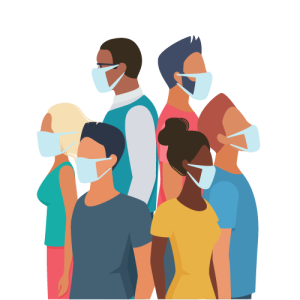Masks
Protect Your Health
 Masks may help offer protection against COVID-19, including the Omicron variant. If you choose to wear a mask, the CDC offers you guidance [Español ]to help you achieve the best result.
Masks may help offer protection against COVID-19, including the Omicron variant. If you choose to wear a mask, the CDC offers you guidance [Español ]to help you achieve the best result.
Situations where you should always wear a mask:
|
|
Situations where masks are required
|
Setting Specific Guidance |
Masks at the Workplace |
Certain people should not wear a mask:
|
Quarantine and Isolation
During a local COVID-19 outbreak, stores may run out of some supplies, and residents may be asked not to leave their homes for an extended period. Residents should plan and prepare by doing the following:
- Have on hand enough food, household and pet supplies to last for two weeks.
- Gather enough medical supplies to last for one month, especially prescriptions and other medicines you may need.
- Identify a list of people who can help you or will need to be notified in the event of an emergency, including family, friends, neighbors, carpool drivers, healthcare providers, teachers, employers, the local public health department and other community resources.
- Identify people who may need help, like neighbors, friends, family and co-workers who are older adults, have limited resources, have special needs, don’t understand English well or are new to the area.
- Talk to your employer about changes at work, how family and sick leave will be handled and if there are plans to work from home or elsewhere.
Last Updated: August 7, 2024
